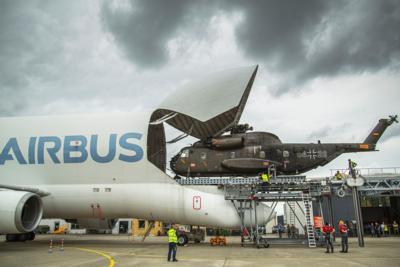Sun, Sep 25, 2022
After 1.5 Years of Design, Testing, & Development, BelugaST Fleet Sees Improved Loading Equipment
Airbus Defence and Space has successfully tested a new and improved loading system for its Beluga A300-600St aircraft, testing it out on a German CH53.

Outsized cargo is the raison d'être of the Beluga series, with an expanding customer base for the unique fleet as air cargo demand rises around the world. The new loading system aims to simplify and streamline the process of cargo transfer to the inconveniently located door aboard the aircraft. With the cargo compartment situated above the cockpit, cargo loading could quickly become a precarious, time consuming affair, a far cry from the simplicity of high-wing aircraft with a drive-up ramp. The new system aims to provide a quicker, cleaner, and safer method to load the picky aircraft, with teams at Airbus Defence working with customers around the world to develop a clean-sheet approach to process.
The end result is a mobile cargo loading system that requires no crane use, with a loading capacity of 35 tonnes. The test saw a German CH53, intact sans rotor blades, secured aboard the Beluga within an hour and a half total, only 1 hour of which was spent loading the helicopter directly. The new design isn’t a static emplacement, either, allowing the Beluga fleet to utilize the jigs and loading system in a variety of locations wherever they’re needed. While a minor benefit to some objects, the enhanced mobility adds security to some of the most valuable assets flown aboard the Beluga fleet, like irreplaceable art or one-of-a-kind historical objects. A mobile loading system should mean that far-flung cargo won’t be required to undergo as much ground travel to reach a suitably equipped airport, minimizing exposure to risk. The new equipment is good news for prospective customers of the BelugaST fleet, who have been freed up for charter with the advent of their successor, the
BelugaXL. Airbus has not yet announced plans to open the XL to private work yet, instead putting the A330-200 variant to work transporting materials between Airbus manufacturing sites.
“The demand for outsized air cargo capability is on the rise. Capacity is scarce and, in light of current geopolitical developments, many customers are looking for new, fast and efficient solutions. This is exactly what we offer with our BelugaST fleet,” said Michael Schoellhorn, CEO of Airbus Defence and Space. “Our teams have been working on a remarkable solution to facilitate a speedy, efficient and autonomous handling to load heavy military cargo onto the aircraft. Speed, agility and autonomy are crucial elements for our customers when it comes to such operations.”
More News
Ultrahigh Frequency (UHF) The frequency band between 300 and 3,000 MHz. The bank of radio frequencies used for military air/ground voice communications. In some instances this may >[...]
During The 7 Second Descent, There Was Another TAWS Alert At Which Time The Engine Remained At Full Power On October 24, 2025 at 2115 mountain daylight time, a Cirrus SR22T, N740TS>[...]
From 2009 (YouTube Edition): Educational Organization Aims to Inspire by Sharing Tuskegee Story Founding leader Don Hinz summarized the Red Tail Project’s mission in simple, >[...]
“This feels like an important step since space travel for people with disabilities is still in its very early days... I’m so thankful and hope it inspires a change in m>[...]
Also: New Katanas, Kern County FD Training, IndiGo’s Botched Roster, MGen. Leavitt Named ERAU Dean The Australian Transportation Safety Bureau (ATSB) has wrapped up its inves>[...]
 ANN's Daily Aero-Term (12.19.25): Ultrahigh Frequency (UHF)
ANN's Daily Aero-Term (12.19.25): Ultrahigh Frequency (UHF) NTSB Prelim: Cirrus Design Corp SR22T
NTSB Prelim: Cirrus Design Corp SR22T Classic Aero-TV: The Red Tail Project--Carrying the Torch of the Tuskegee Airmen
Classic Aero-TV: The Red Tail Project--Carrying the Torch of the Tuskegee Airmen Aero-News: Quote of the Day (12.19.25)
Aero-News: Quote of the Day (12.19.25) Airborne 12.17.25: Skydiver Hooks Tail, Cooper Rotax Mount, NTSB v NDAA
Airborne 12.17.25: Skydiver Hooks Tail, Cooper Rotax Mount, NTSB v NDAA



